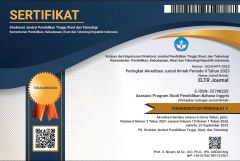THE IMPLEMENTATION OF PROJECT-BASED LEARNING IN AN ESP CLASS TO IMPROVE READING AND SPEAKING SKILLS
Abstrak terlihat: 1328 / PDF terunduh: 777DOI:
https://doi.org/10.37147/eltr.v6i1.126Keywords:
English for Specific Purposes, Project-based learning, reading skills, speaking skillsAbstract
Employing a descriptive qualitative method, the study aims at describing how the implementation of Project-Based Learning (PBL) has improved students’ reading and speaking skills in an English for Specific Purposes (ESP) class at Universitas Atma Jaya Yogyakarta. The contextual and real-life situations designed in PBL are expected to equip them better to practice the language and apply the content knowledge. The results of the questionnaires and interviews suggest that the students generally perceived PBL as an effective and creative method in learning. It has also helped them acquire better reading and speaking skills through the accomplishment of a variety of group projects. The improvements cover, among others, vocabulary, grammar as well as fluency and confidence in speaking. It is hoped that this research can provide benefits to researchers and FBE UAJY in general. The results of this study may provide meaningful inputs on the process of teaching and learning activities. Thus, ESP lecturers can find the most appropriate method to improve students’ English skills.
Downloads
References
Aldabbus, S. (2018). Project-Based Learning: Implementation & challenges. International Journal of Education, Learning and Development, 6(3): 71-79. www.ejournals.org
Andrews, J., & Rapp, D. (2015). Benefits, costs, and challenges of collaboration for learning and memory. Transnational Issues in Psychological Science, 1:182-191. Doi:10.1037/tps0000025
Blumenfeld, C., Soloway, E., Marx, W., Krajcik, S., Guzdial, M. & Palincsar, A. (2001). Motivating Project-Based Learning: Sustaining the Doing, Supporting the Learning. Educational Psychologist, 26(3 & 4). Lawrence Erlbaum Associates, Inc, pp. 369-398.
Calhoun, E.F. (1994). How to Use Action Research in the Self-Renewing School. Alexandria, VA: Association for Supervision and Curriculum Instruction.
Collins, J. (2009). Higher-order thinking in the high-stakes accountability era: Linking student engagement and test performance. Unpublished doctoral dissertation, University of Missouri.
Dewi, M.S. (2020). The Effect of Project-Based Learning and Learner Autonomy on Students' Speaking Skills. Journal of Educational Research and Evaluation, 4(1): 82-89. https://ejournal.undiksha.ac.id/index.php/JERE
Frank, M., Lavy, I. & Elata, D. (2003). Implementing the Project-Based Learning Approach in an AcademicEngineering Course. International Journal of Technology and Design Education. Kluwer Academic Publishers, pp 273-288.
Gay, L.R. & Airasian, P. (2003). Educational Research: Competencies for Analysis and Application (7th edition). Columbus, Ohio: Merril Prentice Hall.
Glickman, C.D. (1992). The Essence of School Renewal: The Prose Has Begun. Educational Leadership, 50(1), 24-27.
Green, A. M. (2015). Project-Based-Learning: Moving Students Toward Meaningful Learning. ERIC Database, ED422466.
Johns, Ann M. (1991). English for Specific Purposes (ESP): Its History and Contributions. Teaching English as a Second or Foreign Language (2nd Edition, edited by Marianne Celce-Murcia). New York: Newbury House, pp 67-80.
Kavaliauskiene, G & Kaminskiene, L. (2009). Proficiency in reading, writing, and translation skills: ESP aspect. Vertigo Studios, pp 171-184.
Krajcik, J., Czerniak, C. & Berger, C. (1999). Teaching Science: A Project-Based Approach. McGraw-Hill College, New York.
Lee, J., & VanPatten, B. 2003. Making Communicative Language Teaching Happen (2nd ed.). New York: McGraw Hill
Mafruudloh, N., & Fitriati, R. (2020). The Effect of Project-Based Learning to the Students’ Speaking Ability. Celtic: A Journal of Culture, English Language Teaching, Literature and Linguistics, 7(1).
Nassaji, H. (2015). Qualitative and descriptive research: Data type versus data analysis. Language Teaching Research, 19(2), 129–132. https://doi.org/10.1177/1362168815572747
Nuttal, C. (1996). Teaching Reading Skill in Foreign Language. (2nd Edition). Oxford: Heinemann.
Orr, Thomas. (2002). The Nature of English for Specific Purposes. English for Specific Purposes (edited by Thomas Orr). Alexandria, Virginia: Teachers of English to Speakers of Other Languages, Inc., pp. 1-6.
Preuss, D. A. (2002). Creating a Project-Based Curriculum. Tech Directions, 62(3)., pp. 16–19.
Rybakova, E., & Kudinova, T. (2020). Project Activity in Teaching ESP. Advances in Economics, Business and Management Research, 128.
Salem, A. (2017). Engaging ESP Students with Brain-Based Learning for Improved Listening Skills, Vocabulary Retention and Motivation. English Language Teaching, 10(12). http://doi.org/10.5539/elt.v10n12p182
Shih, W., & Tsai, C. (2017). Students' perception of a flipped-classroom approach to facilitating online project-based learning in marketing research courses. Australasian Journal of Educational Technology, 33(5): 32-49. https://doi.org/10.14742/ajet.2884
Shin, M. (2018). Effects of Project-based Learning on Students’ Motivation and Self-efficacy. English Teaching, 73(1). http://doi.org/10.15858/engtea.73.1.201803.95
Syakur, A., Junining, E., & Sabat, Y. (2020). The Implementation of Project-Based Learning (PBL) Model Towards the Result Student’s TOEFL in 7th semester of Brawijaya University. Journal of Development Research, 4(1):41-46. https://doi.org/10.28926/jdr.v4i1.97
Syzenko, A., & Diachkova, Y. (2020). Building Cross-Cultural Competence in a Foreign Language through Technology-Enhanced Project-Based Learning. Amazonia Investiga, 9(27). http://dx.doi.org/10.34069/AI/2020.27.03.45
Thomas, J. W. (2000). A Review of Research on Project-Based Learning. Retrieved 18 January 2018 from http://www.autodesk.com/foundation
Wongdaeng, M., & Hajihama, S. (2018). Perceptions of Project-Based Learning on Promoting 21st Century Skills and Learning Motivation in a Thai EFL setting. Journal of Studies in the English Language, 13(2):158-190. https://so04.tci-thaijo.org/index.php/jsel/article/view/113931
Zare-Behtash, E., & Sarlak, T. (2017). The Effect of Project-Based Learning (PBL) on the Components of Speaking Ability of Iranian EFL Beginner Learners. Journal of Applied Linguistics and Language Research, 4(3): 119-130.
Downloads
Published
How to Cite
Issue
Section
License
Copyright (c) 2022 Ignatius Indra Kristianto, Monica Ella Harendita

This work is licensed under a Creative Commons Attribution-ShareAlike 4.0 International License.











 ELTR Journal,
ELTR Journal, 